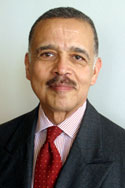ARCHIVES
OF EDITORIALS
August 4, 2005
An encouraging trend
Economic reports on African Americans are usually
disquieting. However, a recent United States Census Bureau report
on the growth of minority businesses is encouraging.
The Census Bureau’s survey of business owners found that
while the overall number of businesses grew by 10 percent between
1997 and 2002, the number of black-owned businesses grew by 45
percent. That is a substantial jump in just five years.
The Census Bureau definition of a business is an entity that files
taxes as an individual proprietorship, a partnership or a corporation
and earns $1,000 or more in revenue a year. It is not necessary
to have employees to be considered a business.
With a business growth rate more than four times the national
average, the African American business boom exceeded that of other
minorities. Latino-owned businesses grew by 31 percent and Asian-owned
businesses grew by 24 percent during that five-year period.
Most American businesses are so small that they do not even have
employees. The national average is that only 24 percent of businesses
have employees. Black-owned businesses are substantially smaller
than the national average. In 2002 only eight percent of black
businesses had employees.
The average annual salary for employees of black businesses in
2002 was $23,440. This was less than the average for all firms
– $34,420. Nonetheless, black-owned firms were able to provide
jobs for 770,746 employees in 2002.
It is encouraging to see that so many African Americans have decided
to venture out on their own and go into business for themselves.
Financial support services and business opportunities must be
available to encourage those who want to become entrepreneurs
and to enable existing businesses to grow.
In plain view
The luxuries that a successful business career provides can be
very seductive. Some youngsters are inspired to study hard, go
to college and business school, then enter the world of industry
and finance. Other youngsters view that road as too remote and
fraught with failure. They prefer the quick returns that life
in the underworld offers, despite the peril.
It is incumbent upon society to establish for all to see that
“crime does not pay.” Poor blacks find it hard to
believe that dealing in drugs is not financially profitable. Indeed,
one might choose to eschew that line of business for moral reasons;
nonetheless, the possibility of accumulating a substantial sum
of money in a short time is very possible.
City, state and federal law enforcement recently closed down a
sophisticated crack-cocaine ring operating in Roxbury, Mattapan,
the South End and Jamaica Plain. Estimates are that the ring may
have been operating for a decade with revenues of $50 million.
When one considers that there were estimated sales of $450,000
per month for an extended period of time, the police must have
been aware of the traffic. At $10 a pop, that amounts to 45,000
sales a month.
Such volume should have aroused the attention of the police much
earlier. Also, the ringleaders were not inconspicuous while riding
around in Bentleys. Perhaps it is time to investigate whether
any of the police were silent accomplices in the enterprise.
How can community activists be expected to curb youth violence
when the police permit an open and notorious drug ring to operate
for a decade?
Home
Page

